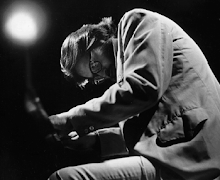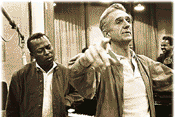The ballad begins with a statement. The piano plays the melody and draws it accurately, not merely an introduction. Marks an idea. Then the tenor bursts gently but forcefully. It is a lament. The brushes make a laconic pace that seems to hold the saxophone. The piano builts a fund of high notes, precious, memories of what it was, what it could be, what is no longer, we now explain why the sax laments. I'm a fool to want you (Sinatra) is included on the album Ballads (Blue Note, 1991), a collection of standards that allow us to judge Dexter Gordon's potential in slow songs. The pianist is Barry Harris and the drummer is Billy Higgins.
 Dexter Gordon was a singular bopper. From his beginnings with Lionel Hampton and Fletcher Henderson he drank the sense that there is nothing written that cannot be overcome, from the days of Bird and Dizzy's bebop Dexter inherited what was going to survive to his folly, what would survived for years, of his own way of playing many tenors have drawn conclusions. Obscured by the brightness of other contemporary tenors such as Sonny Rollins and John Coltrane, Dexter was a great guy in every sense of the word. Women felt impressed by his height, men by the force his presence suggested. However, he was able to extract from his sax powerful and sweet (at the same time) ballads without becoming maudlin. And this is enough merit to hear this disc.
Dexter Gordon was a singular bopper. From his beginnings with Lionel Hampton and Fletcher Henderson he drank the sense that there is nothing written that cannot be overcome, from the days of Bird and Dizzy's bebop Dexter inherited what was going to survive to his folly, what would survived for years, of his own way of playing many tenors have drawn conclusions. Obscured by the brightness of other contemporary tenors such as Sonny Rollins and John Coltrane, Dexter was a great guy in every sense of the word. Women felt impressed by his height, men by the force his presence suggested. However, he was able to extract from his sax powerful and sweet (at the same time) ballads without becoming maudlin. And this is enough merit to hear this disc.The saxophone is one of the most representative instruments of jazz. In fact, if you ask a layman, he will always point to this instrument. But the saxophone is a relatively new invention. Adolphe Sax created it in 1840. Professional musicians of the 19th century compared its sound with a "clarinet with double pneumonia." Someone said recently that it sounded like an inspired donkey. I can not remember who it was. Maybe I read it.
Adolphe Sax used to suffer insults when people heared the sound of the sax for the first time. Anyone who is not a musician and had tried to make it sound knows what I mean. Someone wrote in a medical journal of the era that sax produced consumption! Sax finally escaped from persecution and established a good amount of instruments, including a so delicate, a technical marvel: the flugelhorn .
I always think about these stories when I listen to I'm a fool to want you. The sensitivity of the tenor sax touches me and I cannot help concluding that in this world of miseries and atrocities, Dexter Gordon is a myth and a monster, in the artistic meaning of this words.
____________ ____________
* Photo: Dexter Gordon on 1948, perhaps the picture that best describes him. By Herman Leonard, of course.











No comments:
Post a Comment